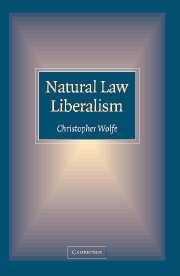Introduction
Published online by Cambridge University Press: 24 July 2009
Summary
Should liberals ground their liberalism in classical natural law? Should those who take their orientation from natural law theory necessarily be liberals?
Many liberals and natural law theorists will regard each other as distinctly unlikely (and uncomfortable) bedfellows. They will feel, in fact, that if they wake up and find themselves in bed with each other, it must have been the result of some improbable Shakespearean plot in which one's expected bedfellow has been switched and the difference has not been noticed until the following morning.
The proponents of natural law, tracing their roots to Thomas Aquinas, and in many ways back beyond him to the classical Greek natural right tradition, maintain that it is possible for human beings to recognize a wide range of objective human goods. They believe these goods provide a necessary framework for political life, for understanding and pursuing the common good. Liberals, tracing their roots through John Stuart Mill back to John Locke, and in certain ways further back to Thomas Hobbes, are more skeptical of the possibility of agreement on what is good for human beings, and would limit the object of political life to defending the rights of individuals to pursue their own ideas of the good. Natural law theorists defend “regulating morality,” while liberals generally oppose it. Can there be fundamental agreement between such apparently distinct traditions of thought?
- Type
- Chapter
- Information
- Natural Law Liberalism , pp. 1 - 6Publisher: Cambridge University PressPrint publication year: 2006

